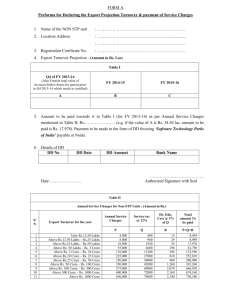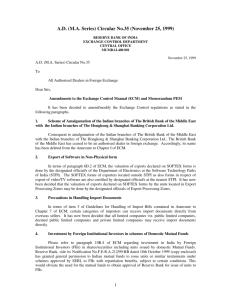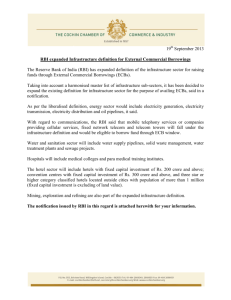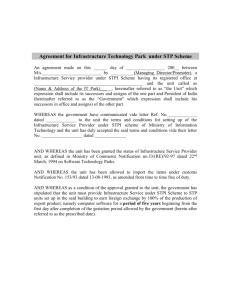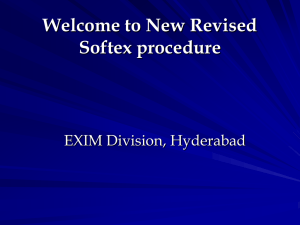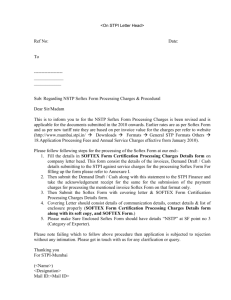Non-STP FAQs - Software Technology Parks of India
advertisement
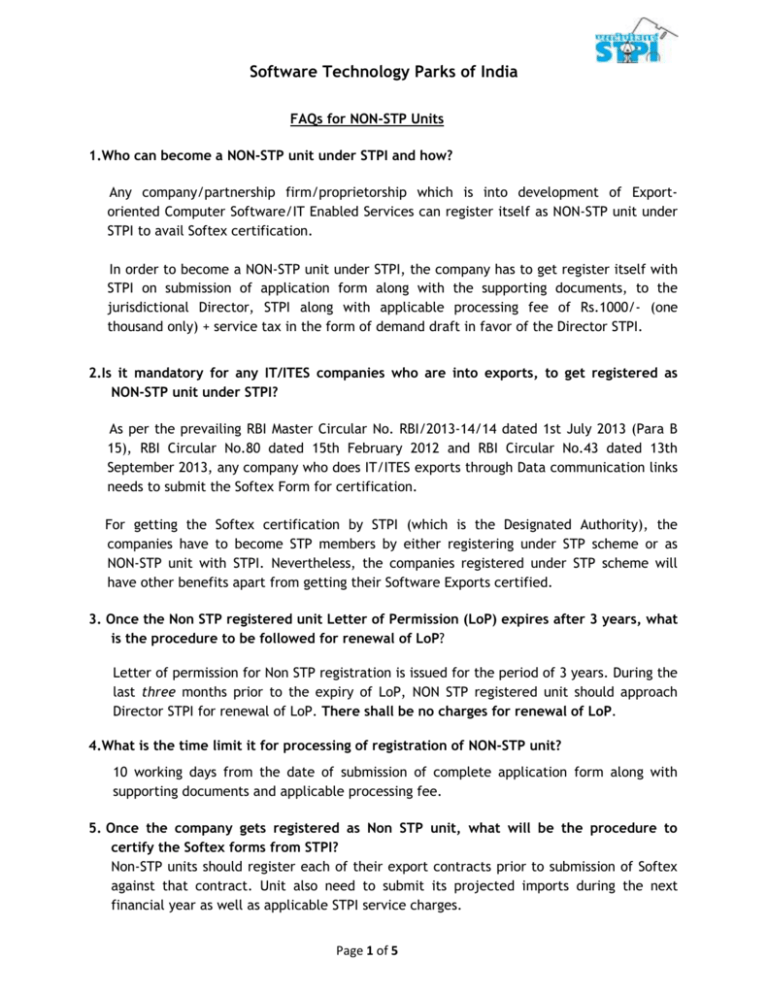
Software Technology Parks of India FAQs for NON-STP Units 1.Who can become a NON-STP unit under STPI and how? Any company/partnership firm/proprietorship which is into development of Exportoriented Computer Software/IT Enabled Services can register itself as NON-STP unit under STPI to avail Softex certification. In order to become a NON-STP unit under STPI, the company has to get register itself with STPI on submission of application form along with the supporting documents, to the jurisdictional Director, STPI along with applicable processing fee of Rs.1000/- (one thousand only) + service tax in the form of demand draft in favor of the Director STPI. 2.Is it mandatory for any IT/ITES companies who are into exports, to get registered as NON-STP unit under STPI? As per the prevailing RBI Master Circular No. RBI/2013-14/14 dated 1st July 2013 (Para B 15), RBI Circular No.80 dated 15th February 2012 and RBI Circular No.43 dated 13th September 2013, any company who does IT/ITES exports through Data communication links needs to submit the Softex Form for certification. For getting the Softex certification by STPI (which is the Designated Authority), the companies have to become STP members by either registering under STP scheme or as NON-STP unit with STPI. Nevertheless, the companies registered under STP scheme will have other benefits apart from getting their Software Exports certified. 3. Once the Non STP registered unit Letter of Permission (LoP) expires after 3 years, what is the procedure to be followed for renewal of LoP? Letter of permission for Non STP registration is issued for the period of 3 years. During the last three months prior to the expiry of LoP, NON STP registered unit should approach Director STPI for renewal of LoP. There shall be no charges for renewal of LoP. 4.What is the time limit it for processing of registration of NON-STP unit? 10 working days from the date of submission of complete application form along with supporting documents and applicable processing fee. 5. Once the company gets registered as Non STP unit, what will be the procedure to certify the Softex forms from STPI? Non-STP units should register each of their export contracts prior to submission of Softex against that contract. Unit also need to submit its projected imports during the next financial year as well as applicable STPI service charges. Page 1 of 5 6. What is the proof of NON-STP registration? The company registered under STPI as NON-STP unit will be issued a Registration Certificate with a validity of 3 years by the respective jurisdictional STPI Director. Renewal of registration will have to be applied three months prior to the expiry of the registration. 7.Can a NON-STP operate from any location in the country? Yes, operations as NON-STP unit can be carried out from any location in the country. However, registration has to be made with the respective jurisdictional STPI Centre. 8.What are the entitlements of NON-STP registration? Once NON-STP units get registered with STPI, they will be entitled for submission of Softex for certification as per prevailing guidelines of RBI. However, Non-STP units should also register each of their export contracts prior to submission of Softex against that contract. 9. Is the Softex submission by NON-STP units mandatory? As per the prevailing RBI Master Circular No. RBI/2013-14/14 dated 1st July 2013, RBI Circular No.80 dated 15th February 2012, RBI Circular No.43 dated 13th September 2013, “any company who does IT/ITES exports through Data communication links needs to submit the Softex to Designated Authority for certification.” 10. What is the mode of submission of Softex? As per the prevailing RBI Circulars, the Softex may be submitted in soft copy or in the hard copy in quadruplicate. 11. Does the unit gets back all the four copies of Softex forms after Certification by STPI? After certification, the distribution of certified Softex (hard copy) will be as follows: a. b. c. d. Original copy will be forwarded to RBI. Duplicate copy to the unit, the triplicate copy to the Authorized Dealer (through unit) and Quadruplicate copy will be retained by STPI for records. 12. What is the frequency of submission of Softex? A common monthly Softex in the form of Excel summary sheet as prescribed by RBI can be filed for all invoices raised in a month. The Softex is required to be filed within 30 days from the date of last invoice raised in that month. 13. What happens if the unit fails to submit Softex Forms on time to STPI? In case of delay, the units should approach the regional RBI office and get the delay condoned before submitting the Softex Forms to STPI. The sample check list of details to Page 2 of 5 be provided to RBI, along with the request letter, for getting the delay condoned, is as per Annexure-1. However, as the list may vary across different regional offices of RBI, you are requested to visit RBI website at www.rbi.org.in for clarity. 14. Who allots the Softex numbers, STPI or RBI? Softex numbers are allotted by RBI. Both STP and NON-STP units based on their requirement can generate Softex numbers online from RBI official website. 15. What is the time frame for certification of Softex by STPI? 30 days from the date of submission of complete Softex form along with requisite documents. 16. What are the charges for certification of Softex by STPI? Service charges for Non-STP units will be determined on the basis of the value of the contracts registered. The Service charges slabs for different export values are as mentioned below: S/N 1 Export Turnover for the year Upto Rs.12.50 Lakhs Annual Service Charges (INR) for Non-STP Units 4,000.00 2 Above Rs.12.50 Lakhs – Rs.25 Lakhs 8,000.00 3 Above Rs.25 Lakhs – Rs.50 Lakhs 16,000.00 4 Above Rs. 50 Lakhs – Rs. 3 Crore 55,000.00 5 Above Rs. 3 Crore – Rs. 10 Crore 1,10,000.00 6 Above Rs.10 Crore – Rs. 25 Crore 2,25,000.00 7 Above Rs.25 Crore – Rs. 50 Crore 2,50,000.00 8 Above Rs. 50 Crore – Rs. 100 Crore 3,50,000.00 9 5,75,000.00 10 Above Rs. 100 Crore – Rs. 500 Crore Above 500 Crore – Rs. 1000 Crore 11 Above Rs. 1000 Crore 6,50,000.00 6,00,000.00 Note: Applicable taxes at actuals are extra 17. What is the payment mode for Service charges? The service charge has to be paid upfront during the registration of contracts based on the contract value and export projection for that particular year. The payment can be made either through following in favor of Director, STPI <center_name>:a. Bankers Cheque b. Demand Draft c. Transfer (Account to Account) d. RTGS e. NEFT f. or through wire transfer. Page 3 of 5 18. What happens if the submitted/certified Softex value exceeds the projected value for a particular year? Once the Non-STP units crosses the limit of a particular slab of value of Softex certified in a financial year they will be required to deposit the applicable charges as against the next slab with due adjustment to the already paid amount. 19. Under what circumstances, the unit should go for cancellation of Softex form? The Softex is required to be filed within 30 days from the date of last invoice raised in that month. But there are situations during which the transaction/ invoice raised might not receive the desired remittance like credit note raised, penalty raised by foreign company or complete cancellation of software project by foreign client. Hence, the unit should approach regional RBI office for cancellation of certified Softex Forms. Once RBI issues the approval of cancellation of particular Softex forms, the same may be reported to the concerned STPI center. 20. What will happen to the Service Charges paid, in case of non-certification of Softex by STPI? As STP unit for each year pay Advance Service Charges but in the event of noncertification of submitted Softex (due to non-submission of required details), STPI shall retain 20% of the Service Charges deposited for that financial year. 21. What is the procedure for cancellation of certified Softex Forms? The units shall approach regional RBI office for cancellation of certified Softex Forms. 22. Is there is any reporting required by the NON-STP units? Once registered with STPI, the Non-STP units shall submit quarterly report and annual reports to respective STPI centers as per the prescribed format. Note: The detailed procedure for NON-STP registration and Softex Certification along with the relevant document formats is made available in the respective STPI center’s website. Page 4 of 5 Annexure-1 Check List of information/documents to be provided to RBI (may vary across different regional offices of RBI) for obtaining permission for delayed submission of Softex*: 1. Import/Export (IE) Code. 2. Reason for late submission (valid reason expected and supporting documents to corroborate exporters’ argument for delay). 3. Proof of submission of Softex Forms for the previous years. 4. Proof of submission of Softex Forms for the subsequent years. 5. Total number of Softex Forms to be submitted, giving full details as to the amount of each Softex Form, along with the month and year of the invoice pertaining to the Softex Form. 6. Copy of rejection letter if any. 7. Name of STPI/SEZ Center to which Softex Forms are being submitted. 8. Condonation given if any, earlier: a. Date of Condonation b. Total number of Softex Forms c. Period of Softex Forms 9. Undertaking (on letterhead of the Non-STP unit – Stamp and signed by an authorized signatory) that no Softex Forms, other than the ones mentioned in the letter are pending for submission to STPI. 10. Whether actual exports of the lot of Softex Forms not submitted to STPI has already been effected, if yes, when? 11. If exports have already been effected, whether export proceeds have been realized? 12. The name of the AD Bank and its code. 13. Details of invoices as certified by AD Bank, viz, Invoice value, number, date and currency, client name, Softex Number, amount realized and date of realization, FIRC number, etc. 14. Undertaking from exporter (on letterhead of the Non-STP unit – Stamp and signed by an authorized signatory) (confirming lapses for delay in submission of Softex Forms would not recur in future). Note:-For further updates, please refer to the RBI website www.rbi.org.in. Page 5 of 5
